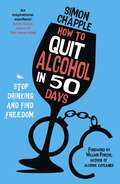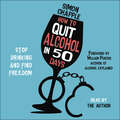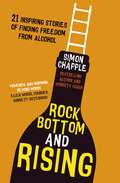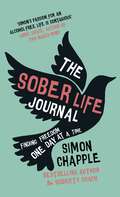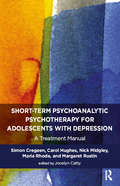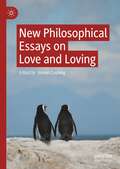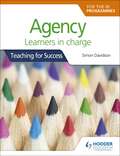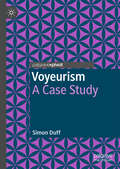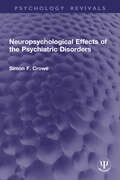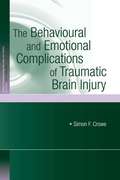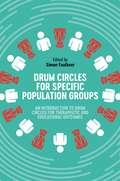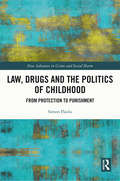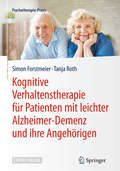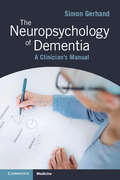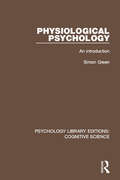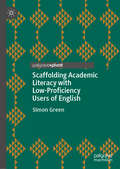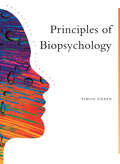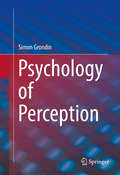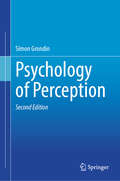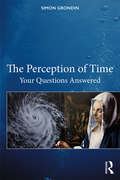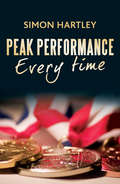- Table View
- List View
How to Quit Alcohol in 50 Days: Stop Drinking and Find Freedom
by Simon Chapple'AN INSPIRATIONAL MANIFESTO' - Annie Grace'SIMON IS FABULOUS - YOU HAVE NOTHING TO LOSE AND EVERYTHING TO GAIN!' - Clare PooleyDo you feel trapped by alcohol? Do you find yourself thinking about drinking too often? Do you put alcohol ahead of the most important things in your life? If so - here's some good news. You can quit drinking, and it's not as difficult as you think.Simon Chapple is a Certified Alcohol Coach who has helped thousands of people change the way that alcohol features in their lives. In How to Quit Drinking in 50 Days he'll give you a structured way to find complete freedom from alcohol - for now, or forever.This 50-day journey to freedom is split into two parts. Days 1-25 will ask you to take an honest look at the impact alcohol has had on your life, to examine the reasons for your drinking, and will arm you with the best strategy for quitting alcohol successfully. Days 26-50 will ask you to make the commitment to taking a break from alcohol - taking each step with one chapter a day, and answering the questions that come up.There are strategies for dealing with challenges and setbacks, and a wealth of resources for finding support and inspiration. Above all, there is a genuine passion for the sober adventure, and the huge rewards of an alcohol-free life - a life of freedom that's waiting for you.*Includes free downloadable workbook and journal* Download the workbook from the John Murray Learning Library website, or the free John Murray Learning app. PREORDERED? VISIT SIMON'S 'BE SOBER' WEBSITE TO CLAIM YOUR PLACE ON AN EXCLUSIVE WORKSHOP
How to Quit Alcohol in 50 Days: Stop Drinking and Find Freedom
by Simon Chapple"The sober life is so superior to the drinking life that there is no contest. But most drinkers have been drinking for many years, or even decades, and find [it] hard to change. The sober coach takes the hand of the reader and shows them the beautiful truth: that alcohol is a pathetic and unpleasant little drug." - William Porter, author of 'Alcohol Explained' "From designing your own sober toolbox to changing your mindset, Simon shows you the path to set yourself up for success." - Judy C."A powerful book. Simon tells it like it is but combines it with a level of care and skill I have not seen in other quit alcohol books" - Neil M.DO YOU FEEL TRAPPED BY ALCOHOL?DO YOU FIND YOURSELF THINKING ABOUT DRINKING TOO OFTEN?DO YOU PUT ALCOHOL AHEAD OF THE MOST IMPORTANT THINGS IN YOUR LIFE?If so - here's some good news. You can quit drinking, and it's not as difficult as you think.Simon Chapple is a Certified Alcohol Coach who has helped thousands of people change the way that alcohol features in their lives. In How to Quit Drinking in 50 Days he'll give you a structured way to find complete freedom from alcohol - for now, or forever.This 50-day journey to freedom is split into two parts. Days 1-25 will ask you to take an honest look at the impact alcohol has had on your life, to examine the reasons for your drinking, and will arm you with the best strategy for quitting alcohol successfully. Days 26-50 will ask you to make the commitment to taking a break from alcohol - taking each step with one chapter a day, and answering the questions that come up.There are strategies for dealing with challenges and setbacks, and a wealth of resources for finding support and inspiration. Above all, there is a genuine passion for the sober adventure, and the huge rewards of an alcohol-free life - a life of freedom that's waiting for you.Download the accompanying workbook from the John Murray Learning Library website, or the free John Murray Learning app. (P) 2020 Hodder & Stoughton Ltd
Rock Bottom and Rising: 21 Inspiring Stories of Finding Freedom from Alcohol
by Simon ChappleEdited and with contributions by Lois Badey'I have a secret. Secrets can be dangerous. They make tell lies. You can lie to others, but mostly, you lie to yourself...' - JanetDrawing from his 35,000-member strong community, one of the country's most successful sobriety coaches, Simon Chapple brings us real, raw, relatable stories from individuals who've found joy in an alcohol-free life. Powerful, healing, resonant and true, the experiences in this unforgettable book will make a real impact on anyone who is exploring their relationship with alcohol, or who needs support, inspiration, or a reason to go sober. Featuring contributions from some of the most well-known personalities in the Sober Space, sharing their own extraordinary journies, some of these stories are shocking, some are moving, some will make you cringe and others will make you laugh out loud; all are inspiring and powerfully motivating. The hope is that readers will see their own lives reflected in these incredible narratives, and find the courage to take a step forward into a new life. With a full commentary from the author alongside each chapter, to provide an easy understanding of the takeaways from each story, the book will also carry QR codes that link directly to Simon's popular YouTube channel to further help you on your journey to sober joy.Why not invest in THE SOBER JOURNAL - a space for your own reflections, marking your own journey to freedom and joy?
Rock Bottom and Rising: 21 Inspiring Stories of Finding Freedom from Alcohol
by Simon ChappleEdited and with contributions by Lois Badey'I have a secret. Secrets can be dangerous. They make tell lies. You can lie to others, but mostly, you lie to yourself...' - JanetDrawing from his 35,000-member strong community, one of the country's most successful sobriety coaches, Simon Chapple brings us real, raw, relatable stories from individuals who've found joy in an alcohol-free life. Powerful, healing, resonant and true, the experiences in this unforgettable book will make a real impact on anyone who is exploring their relationship with alcohol, or who needs support, inspiration, or a reason to go sober. Featuring contributions from some of the most well-known personalities in the Sober Space, sharing their own extraordinary journies, some of these stories are shocking, some are moving, some will make you cringe and others will make you laugh out loud; all are inspiring and powerfully motivating. The hope is that readers will see their own lives reflected in these incredible narratives, and find the courage to take a step forward into a new life. With a full commentary from the author alongside each chapter, to provide an easy understanding of the takeaways from each story, the book will also carry QR codes that link directly to Simon's popular YouTube channel to further help you on your journey to sober joy.Why not invest in THE SOBER JOURNAL - a space for your own reflections, marking your own journey to freedom and joy?
The Sober Life Journal: Finding Freedom One Day At A Time
by Simon ChappleThe Sober Life Journal is an all-new format that captures the essence of journaling and provides space to grow and develop as you embark on a sober life. With hundreds of writing prompts, pages for reflection, focus, inspiration and guided exercises, this beautiful new journal supports your intention to create something lasting and meaningful to accompany you on your journey to an alcohol-free life.Every day is a new fresh page, and this journal gives you the time, the tools and the safe space you need to take things one step at a time as you journey one day at a time towards a life full of joy and freedom.
The Sober Life Journal: Finding Freedom One Day At A Time
by Simon ChappleThe Sober Life Journal is an all-new format that captures the essence of journaling and provides space to grow and develop as you embark on a sober life. With hundreds of writing prompts, pages for reflection, focus, inspiration and guided exercises, this beautiful new journal supports your intention to create something lasting and meaningful to accompany you on your journey to an alcohol-free life.Every day is a new fresh page, and this journal gives you the time, the tools and the safe space you need to take things one step at a time as you journey one day at a time towards a life full of joy and freedom.
Short-term Psychoanalytic Psychotherapy for Adolescents with Depression: A Treatment Manual (Tavistock Clinic Series)
by Simon CregeenShort-term Psychoanalytic Psychotherapy (STPP) is a manualised, time-limited model of psychoanalytic psychotherapy comprising twenty-eight weekly sessions for the adolescent patient and seven sessions for parents or carers, designed so that it can be delivered within a public mental health system, such as Child and Adolescent Mental Health Services in the UK. It has its origins in psychoanalytic theoretical principles, clinical experience, and empirical research suggesting that psychoanalytic treatment of this duration can be effective for a range of disorders, including depression, in children and young people. The manual explicitly focuses on the treatment of moderate to severe depression, both by detailing the psychoanalytic understanding of depression in young people and through careful consideration of clinical work with this group. It is the first treatment manual to describe psychoanalytic psychotherapy for adolescents with depression.
New Philosophical Essays on Love and Loving
by Simon CushingNew philosophical essays on love by a diverse group of international scholars. Topics include contributions to the ongoing debate on whether love is arational or if there are reasons for love, and if so what kind; the kinds of love there may be (between humans and artificial intelligences, between non-human animals and humans); whether love can explain the difference between nationalism and patriotism; whether love is an necessary component of truly seeing others and the world; whether love, like free will, is “fragile,” and may not survive in a deterministic world; and whether or not love is actually a good thing or may instead be a force opposed to morality. Key philosophers discussed include Immanuel Kant, Iris Murdoch, Bernard Williams, Harry Frankfurt, J. David Velleman, Niko Kolodny, Thomas Hurka, Bennett Helm, Alfred Mele and Derk Pereboom. Essays also touch on the treatment of love in literature and popular culture, from Graham Greene’s The End of the Affair to Spike Jonze’s movie her.
Agency for the IB Programmes: For PYP, MYP, DP & CP: Learners in charge (Teaching for Success)
by Simon DavidsonTeach for success and implement effective strategies to develop a learning community that supports student agency and self-efficacy with this essential guide developed by an experienced PYP educator. - Create opportunities for agency in the classroom with guidance and advice that focusses on the three agency strands: choice, voice and ownership.-Explore the skills of being a learner and how to build these to enable students to influence and direct their own learning. - Discover the role of play in learning with a dedicated chapter looking at the characteristics of play, why it is important and how it can develop understanding in learners of all ages.-Agency is not just about the student - everyone is an agentic learner, even teachers. Learn how to change your growth mindset and become agentic learners too.
Agency for the IB Programmes: For PYP, MYP, DP & CP: Learners in charge (Teaching for Success)
by Simon DavidsonTeach for success and implement effective strategies to develop a learning community that supports student agency and self-efficacy with this essential guide developed by an experienced PYP educator. - Create opportunities for agency in the classroom with guidance and advice that focusses on the three agency strands: choice, voice and ownership.-Explore the skills of being a learner and how to build these to enable students to influence and direct their own learning. - Discover the role of play in learning with a dedicated chapter looking at the characteristics of play, why it is important and how it can develop understanding in learners of all ages.-Agency is not just about the student - everyone is an agentic learner, even teachers. Learn how to change your growth mindset and become agentic learners too.
Voyeurism: A Case Study
by Simon DuffThis book is amongst the first of its kind in presenting a case study of voyeurism from a forensic psychology perspective and within the societal context. Simon Duff provides an in-depth description of the assessment, formulation, and treatment of a voyeur and offers a theoretical basis for the behaviour. The book begins by covering a variety of explanations and previous treatments for voyeurs, including learning theories and the aversive treatments that they give rise to. It then moves on to focus on one specific case study, a young man who has exhibited diversity in his voyeuristic offending, before examining relevant details of his experiences in order to develop a formulation of his thinking and behaviour. The formulation and resultant intervention are clearly and accessibly presented, followed by a discussion of how this case provides direction for further research, developments in our theoretical basis for understanding voyeurism, and directions for assessment and intervention.
Neuropsychological Effects of the Psychiatric Disorders (Psychology Revivals)
by Simon F. CroweOriginally published in 1998, Neuropsychological Effects of the Psychiatric Disorders provided a comprehensive review of the background and literature concerning effects of the psychiatric disorders on cognitive functions at the time. It follows the classification of disease proposed by the Diagnostic and Statistical Manual of Mental Disorders (DSM-IV) and each condition is described in terms of its history, details regarding physical investigations of brain functioning in the disorder, and an extensive review and formulation of the implications of that disorder to cognitive functioning. A selective review of cognitive effects of treatments of the psychiatric disorders both pharmacological and physical is also included.Each chapter features a fully worked case of a disorder in association with the background and presentation of the patient, as well as a full listing of the patient’s performance on specific neuropsychological tests. Techniques for differentiating dementia from depressive illness, as well as clinical guidelines and decision rules in areas of the factitious and dissociative disorders are described. The text is written with an eye to the history of these conditions and contains anecdotal material regarding interesting findings and red herrings.
The Behavioural and Emotional Complications of Traumatic Brain Injury (Studies On Neuropsychology, Neurology And Cognition Ser.)
by Simon F. CroweIt is difficult to imagine what it must be like for someone following the personal crisis and catastrophe that ensues as a result of a serious traumatic brain injury (TBI). The individual is confronted with a huge range of alterations in his or her normal functioning, operating at the biological, psychological and social levels. All of these c
Computational Modeling of Cognition and Behavior
by Simon Farrell Stephan LewandowskyComputational modeling is now ubiquitous in psychology, and researchers who are not modelers may find it increasingly difficult to follow the theoretical developments in their field. This book presents an integrated framework for the development and application of models in psychology and related disciplines. Researchers and students are given the knowledge and tools to interpret models published in their area, as well as to develop, fit, and test their own models. Both the development of models and key features of any model are covered, as are the applications of models in a variety of domains across the behavioural sciences. A number of chapters are devoted to fitting models using maximum likelihood and Bayesian estimation, including fitting hierarchical and mixture models. Model comparison is described as a core philosophy of scientific inference, and the use of models to understand theories and advance scientific discourse is explained. Covers both basic and advanced topics to appeal to students and researchers alike. Provides a framework for using models in a variety of domains across psychology and related disciplines. Describes the application of models by walking through code written in R, a popular and free statistical programming language
Drum Circles for Specific Population Groups: An Introduction to Drum Circles for Therapeutic and Educational Outcomes
by Simon FaulknerWith easy-to-follow instructions for group activities and rhythms, this book provides tools to lead drum circles effectively with people facing a wide variety of life challenges. Sections on outcomes, setting up for success, common challenges and practical adaptations of the drum circle guide you in leading sessions with your own groups. The compendium also offers guidance on pricing, evaluating your sessions, managing challenging behaviours and duty of care.Demonstrating the potential of this empowering creative activity in supporting therapeutic and developmental outcomes, this book equips you to meet the needs of different groups through the healing power of music.
Law, Drugs and the Politics of Childhood: From Protection to Punishment (New Advances in Crime and Social Harm)
by Simon FlacksDebates about the regulation of drugs are inseparable from talk of children and the young. Yet how has this association come to be so strong, and why does it have so much explanatory, rhetorical and political force? The premise for this book is that the relationship between drugs and childhood merits more exploration beyond simply pointing out that children and drugs are both ‘things we tend to get worried about’. It asks what is at stake when legislators, lobbyists and decision-makers revert to claims about children in order to sustain a given legal or policy position. Beginning with a genealogy of the relationship between the discursive artefacts of ‘drugs’ and ‘childhood’, the book draws on Foucauldian methodologies to explore how childhood functions as a device in the biopolitical management of drug use(rs) and supply. In addition to analysing decriminalisation initiatives and sentencing measures, it (unusually) reaches beyond the criminal context to consider the significance of the ‘politics of childhood’ for law- and policymaking in the fields of family justice and education. It concludes by arguing that the currency of childhood and ‘youth’ is not reducible to rhetoric; it shapes the discursive entities of drugs and addiction and is one of the ways in which particular substances become socially, culturally and politically intelligible. At the same time, ‘drugs’ serve as a technology of child normalisation. The book will be essential reading for policymakers as well as researchers and students working in the areas of Criminal Justice, Law, Psychology and Sociology.
Kognitive Verhaltenstherapie für Patienten mit leichter Alzheimer-Demenz und ihre Angehörigen
by Simon Forstmeier Tanja RothDieses Manual bietet erstmals ein umfassendes psychotherapeutisches Behandlungsprogramm für Personen mit einer beginnenden Alzheimer-Demenz und ihre Angehörigen auf Basis der kognitiven Verhaltenstherapie. Das Therapiekonzept beinhaltet sowohl etablierte verhaltenstherapeutische Interventionen wie Aktivitätenaufbau, aber auch alterspsychotherapeutische Elemente wie einen strukturierten Lebensrückblick sowie paartherapeutische Interventionen. Das Behandlungsprogramm wurde bereits erfolgreich wissenschaftlich evaluiert. Der Leser findet eine Anleitung für jede Sitzung und alle dazugehörigen Arbeitsmaterialien für die Patienten.Geschrieben für Psychologische und Ärztliche Psychotherapeuten, Psychiater, Hausärzte mit gerontologischem Schwerpunkt, Klinische Neuropsychologen.Aus dem InhaltI Grundlagen – II Therapie – III Materialien. Alle Materialien zum Download im Internet.
The Neuropsychology of Dementia: A Clinician's Manual
by Simon GerhandAn up-to-date clinical guide for healthcare professionals on the assessment, diagnosis and management of dementia and mild cognitive impairment (MCI), including the role played by neuropsychology in the diagnostic process. Written in an accessible style, it provides a reference book for qualified professionals and a valuable resource for students and trainees working in dementia services. The book covers the diagnosis and management of the most common forms of dementia, and some rarer types, and the latest advances in diagnostic technology and current and future treatment options. It explores non-pharmacological interventions for cognitive impairment and preventative measures to reduce the risk of developing dementia. Featuring the essential background information required by all clinicians working in the field, alongside a review of recent research and developments in the field. With an emphasis on the links between theory and practice, this is a must-read manual for clinicians working in memory clinics.
Physiological Psychology: An Introduction (Psychology Library Editions: Cognitive Science)
by Simon GreenOriginally published in 1987 this title was designed as a textbook for first degree students of psychology and provides an introduction to the major topics within the subject of physiological psychology. The aim was to cover these major subject areas and at the same time to provide indications of advances made in the previous two decades. Today the book is still suitable for all levels of study, from beginning students to final year level, who wish to cover historical aspects of physiological psychology.
Scaffolding Academic Literacy with Low-Proficiency Users of English
by Simon GreenThis book analyses the development of academic literacy in low-proficiency users of English in the Middle East. It highlights the challenges faced by students entering undergraduate education in the region, and the strategies used by teachers to overcome them. The author focuses on a large-scale undergraduate teacher programme run in Oman by the University of Leeds, providing clear pointers both for future research and effective practice. He also explores the implications of his findings for countries beyond the Gulf Cooperation Council, demonstrating how international participation in UK HE could be much wider. This book will appeal to students and scholars with an interest in academic literacies and English for Academic Purposes.
Principles Of Biopsychology
by Simon GreeneThis book is intended to provide an introduction to the basic structure and function of the brain and nervous system, emphasizing relationships with behaviour. The first chapter introduces the field, covering aims, objectives and ethical issues. In chapter 2 the neuron is described, and electrical and chemical conduction presented in detail; this chapter also introduces neurotransmitter pathways and drug effects on normal and abnormal behaviour.; After a general survey of the behavioural organization of the nervous system in chapter 3, three chapters describe how language, learning and memory are related to brain mechanisms, with a particular emphasis on clinical data from human patients, and functional assymetries between the hemispheres. The following chapter outlines the Involvement Of Arousal Systems In Stress, Anxiety And Emotion, And Also covers stress reduction techniques. The arousal theme is maintained in chapter 8 in which sleep is discussed in the context of biological rhythms in psychological and physiological processes.; Chapter 9 covers The Biological Bases Of Motivational States Such As Hunger And Thirst, and discusses the concept of homeostasis. Non-homeostatic drives such as electrical self-stimulation of the brain are also considered. Finally, chapter 10 reviews sensory processes in general, and then concentrates on pain perception and the brain mechanisms underlying visual sensation and perception.; It is intended that the material in this book should satisfy the requirements of both the A-level syllabus for Psychology, whichever Board is taken, and first year introductory undergraduate courses in psychobiology.
Psychology of Perception
by Simon GrondinThis book defines the terminology used in the fields of sensation and perception and describes the biological and physical bases required for understanding sensory experiences. It offers more specifically an introduction to the study of psychophysics, auditory perception, visual perception, and attention, and discusses the basic concepts and mechanisms used to interpret different perceptual phenomena. Featured topics in this book: Laws of psychophysics, including the discrimination law of Weber and Stevens' power law. Psychophysical methods and signal detection theory. Hearing music and speech. Color, form and depth perception The role of attention in perception. Sensory disorders. Psychology of Perception is an essential resource for undergraduate and graduate students interested in studying sensation and perception.
Psychology of Perception
by Simon GrondinThis book defines the terminology used in the fields of sensation and perception and describes the biological and physical bases required for understanding sensory experiences. It offers more specifically an introduction to the study of psychophysics, auditory perception, visual perception, somesthesia, time perception, and attention, and discusses the basic concepts and mechanisms used to interpret different perceptual phenomena. Featured topics in this book: Laws of psychophysics, including the discrimination law of Weber and Stevens&’ power law. Psychophysical methods and signal detection theory. Hearing music and speech. Color, form and depth perception. Time perception. Somatosensory systems. The role of attention in perception. <span style="mso-fareast-font-family: 'Times New Roman'; mso-bidi-font-family: Calibri; mso-bidi-theme-font: minor-latin; mso-ansi
The Perception of Time: Your Questions Answered
by Simon GrondinUsing a concise question and answer format, The Perception of Time: Your Questions Answered examines basic temporal processes and the ways in which our perception of time can be altered. Divided into three parts, the book provides a contemporary overview of the study of the temporal mind. It begins by introducing the fundamental processes of time perception; how it can be measured, how it can be hindered, and to what extent it can be enhanced. It proceeds to explain how cognitive and psychological disorders, such as schizophrenia, ADHD, and anxiety can be linked to temporal dysfunction, and answers common questions that face us all: why does time seem to go faster as we age? How do our emotions affect our perception of time? How does our relationship with time differ from others? Providing comprehensive answers to the most pertinent questions of time perception, this book is an ideal companion for advanced students and researchers interested in the psychology of time.
Peak Performance Every Time
by Simon HartleyPeak performances should not be left to chance. Rather than hoping that you will perform at your best, why not engineer your performance? Peak Performance Every Time incorporates principles from sport psychology and performance coaching and applies these to all areas of life. Using illustrations and real-world examples from top athletes and business executives, it focuses on the three main components that underpin performance: Confidence Motivation Focus. As well as offering practical strategies to help the reader achieve their optimal mindset, it also explains how to coach others to perform to their potential. Throughout, the book is underpinned by theoretical frameworks, literature and research findings and will be invaluable to anyone trying to reach their full potential, in particular athletes, coaches, managers and executives. It may also be of interest to sports psychology, management and business students.
